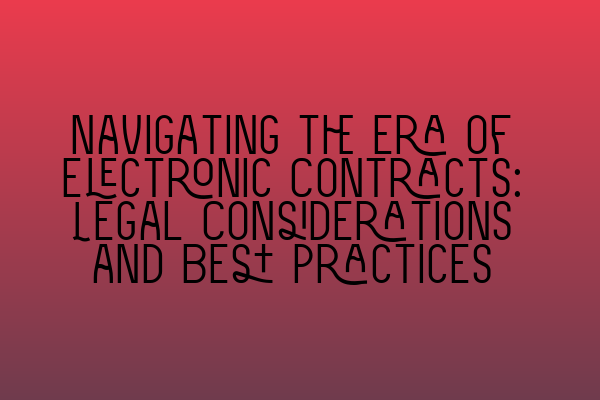Navigating the Era of Electronic Contracts: Legal Considerations and Best Practices
In this digital age, electronic contracts have become increasingly prevalent in the business world. With the convenience and efficiency they offer, electronic contracts have revolutionized the way agreements are made. However, as with any legal matter, there are important considerations and best practices that need to be followed to ensure the validity and enforceability of electronic contracts. In this article, we will explore the legal aspects and offer valuable insights to help you navigate the era of electronic contracts.
1. Understanding Electronic Contracts
Electronic contracts, also known as e-contracts, are agreements that are formed, stored, and transmitted electronically. They encompass a wide range of transactions, from online purchases and software licenses to employment agreements and service contracts. The basic elements of a traditional contract, such as offer, acceptance, consideration, and intention to create legal relations, still apply to electronic contracts. However, the unique nature of electronic transactions requires additional considerations.
2. Legal Considerations
2.1. Consent and Authentication
One of the primary concerns with electronic contracts is ensuring the authenticity and consent of the parties involved. To address this, various laws and regulations have been put in place to establish legal frameworks for electronic signatures. Electronic signatures are used to verify the identity of the signatories and indicate their intent to be bound by the terms of the contract. Understanding the legal requirements for electronic signatures in your jurisdiction is crucial to ensure the validity and enforceability of your electronic contracts.
2.2. Recordkeeping and Retention
Unlike traditional paper contracts, electronic contracts require proper recordkeeping and retention. It is essential to maintain a clear and complete electronic trail of the entire contract process, including offer, acceptance, negotiations, and any subsequent amendments. This documentation is not only important for legal purposes but also for internal recordkeeping and future reference. Implementing a proper document management system will help you retain and access your electronic contracts efficiently.
2.3. Jurisdiction and Governing Law
Another critical consideration when entering into electronic contracts is determining the jurisdiction and governing law that will apply to the agreement. This becomes particularly important in cross-border transactions. Different jurisdictions may have varying requirements and regulations regarding electronic contracts, so it is necessary to seek legal advice to ensure compliance with applicable laws and regulations.
2.4. Data Protection and Security
With the increasing prevalence of cyber threats and data breaches, ensuring the security and protection of electronic contracts and the sensitive information contained therein is of paramount importance. This includes implementing robust security measures, such as encryption and firewalls, to safeguard the confidentiality and integrity of the data. Complying with data protection laws, such as the General Data Protection Regulation (GDPR), is also crucial to avoid legal liabilities and reputational damage.
3. Best Practices
3.1. Clear and Concise Language
To avoid any ambiguity or misinterpretation, it is essential to draft electronic contracts in clear and concise language. Avoid legalese whenever possible, as it can confuse the parties involved and potentially lead to disputes. Use plain language to ensure that all parties fully understand the terms and conditions of the contract.
3.2. Incorporate Dispute Resolution Mechanisms
Including dispute resolution mechanisms, such as mediation or arbitration clauses, in your electronic contracts can help prevent costly and time-consuming litigation. These mechanisms provide alternative methods for resolving disputes in a more efficient and amicable manner. Consider the specific needs of your business and the nature of the agreement to determine the most appropriate dispute resolution mechanism to include in your contracts.
3.3. Regular Review and Updates
Given the constantly evolving nature of technology and the legal landscape surrounding electronic contracts, it is important to regularly review and update your contract templates and processes. This will ensure that they remain compliant with the latest laws and regulations. Engaging legal professionals who specialize in contract law and technology can provide valuable insights and guidance in this regard.
4. Conclusion
As electronic contracts continue to shape the business landscape, it is crucial to understand the legal considerations and best practices associated with them. By ensuring proper consent and authentication, implementing robust recordkeeping and retention practices, considering applicable jurisdiction and governing law, and prioritizing data protection and security, businesses can navigate the era of electronic contracts with confidence. By following these best practices, you can minimize legal risks and maximize the benefits of electronic transactions.
For more information on related topics, check out the following articles:
– SQE Sample Papers: Practice for Exam Success
– Peer Discussions Post-Mock: Learning from Collaboration and Feedback
– Adjusting Strategy Based on Mock Performance: Improving Your Approach
– Strengthening Weak Areas in SQE: Targeted Practice for Improvement
– Effective Revision Techniques for SQE: Maximizing Retention and Recall
